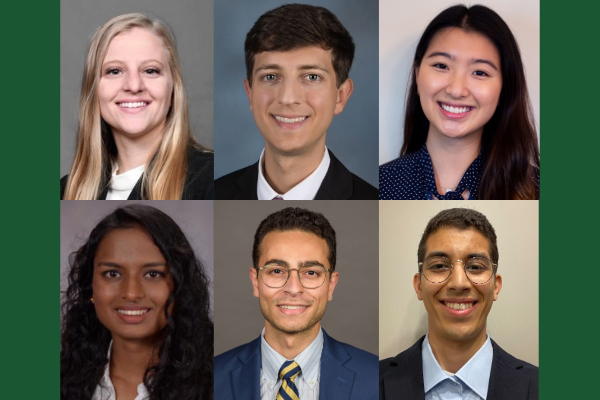As the 2024–2025 Alabama Albert Schweitzer Fellowship draws to a close, seven UAB Heersink School of Medicine students—Andee Beierle, Caroline Davies, Ben Honan, Kavita Kantamneni, Salem Khalaf, Leanne D. Jeong, and Faris Zaibaq—are being recognized for completing their service years, spearheading projects that improved health and well-being across Alabama. Through hands-on work in education, advocacy, and access, these future physicians addressed pressing health care needs while developing leadership skills and experience with community engagement that will shape their medical careers.
The fellowship empowers graduate health students to design sustainable, community-based solutions to health challenges. Supported by mentors and community partners, these fellows created meaningful change that lays the foundation for compassionate, community-centered care.
Fitness for adults with disabilities
Andee Beierle and Caroline Davies aimed to promote physical wellness among adults with intellectual and developmental disabilities, a population that often faces significant barriers to participating in structured wellness programs. Partnering with Unless U, a nonprofit dedicated to enhancing the lives of adults with disabilities, they implemented a tailored fitness and mindfulness curriculum at Post Place, one of the organization’s satellite campuses. Their goal was to foster a supportive environment, encouraging healthy habits and holistic well-being.
Initial participation was slow, as many were hesitant to engage. “The biggest challenge was earning consistent buy-in,” said Beierle. By making sessions fun, approachable, and responsive to participants’ interests—using familiar music, sensory-friendly adaptations, and consistent routines—engagement steadily increased. To improve accessibility, they created an exercise binder with visual aids and activity modifications. Davies explained, “We wanted something that allowed participants and caregivers to follow along at their own pace,” ensuring the programming could accommodate a wide range of physical and cognitive abilities.
With guidance from a virtual community advisory board, their program became more inclusive and responsive. The impact extended beyond fitness—participants gained confidence, independence, and meaningful community connections.
Cultivating thoughtful dialogue and understanding among teens
Ben Honan and Salem Khalaf’s project focused on helping Birmingham high school students develop skills in respectful dialogue and understanding different perspectives. They believed that practicing these skills early would prepare teens to thoughtfully engage with important issues in their communities.
To connect with students, they partnered with two high school classes and four nonprofits by building strong relationships with teachers and community leaders, which expanded their reach and strengthened their collaboration.
Their evidence-based sessions covered professionalism, communication, and advocacy—skills relevant far beyond the classroom. “Armed with these skills, students will be able to advocate for themselves and others, better understand others’ lived experiences, and demonstrate professional competencies like critical reasoning, effective communication, and open-mindedness,” said Honan.
A typical session included watching a TED Talk on cultural humility, practicing dialogue techniques, and applying them in class discussions. As students grew more confident, participation increased. “Watching adolescents develop self-awareness, advocacy, and communication—and seeing how far they’ve come—was incredibly rewarding,” Khalaf said.
Their work gave students a platform for growth and helped build a more engaged, thoughtful community.
Accessible breast health education for all
Kavita Kantamneni and Leanne D. Jeong’s project aimed to expand breast health education in the LGBTQIA+ community by creating accessible materials. Together with three team members, they tackled significant gaps in traditional resources and incorporated critical considerations that can affect breast cancer risk.
Partnering with a local clinic, the team used an app to deliver clear visuals and straightforward explanations in a respectful, affirming environment. Participants responded positively, gaining practical skills such as how to perform self-exams and recognizing early warning signs. Kantamneni shared, “The most rewarding part was connecting with patients who shared personal stories about breast cancer. Knowing that we provided resources that participants planned to share with loved ones was incredibly powerful. “This project demonstrated how health education not only empowers individuals but also fills critical gaps in preventive care.
Improving neighborhood safety through street design
Faris Zaibaq’s project focused on improving street safety along 1st Avenue South in Birmingham’s Woodlawn neighborhood—a road that had become difficult for pedestrians to navigate due to fast-moving traffic and frequent accidents. Working with local residents and organizations, Zaibaq and his team supported the addition of practical improvements such as crosswalks, bike lanes, slower speed zones, and more parking. Before these changes, older residents at Faush Manor described crossing the street as stressful, rating the experience just 4 out of 10. After the project, many shared that getting around the neighborhood had become easier, helping them reach nearby businesses and feel more at ease while spending time outside.
The value of mentorship
Throughout their fellowship, the students emphasized the vital role of mentorship. Community and academic mentors guided them in shaping projects, overcoming obstacles, and growing as leaders. These mentors connected fellows with key resources, offered constructive feedback, and supported their professional development. This guidance was critical in transforming ideas into sustainable programs and highlighted the importance of collaboration in advancing community health.
Advice for future Schweitzer Fellows
Reflecting on their journey, the students shared practical advice for future ASF cohorts: to be patient and flexible, build genuine relationships, and see challenges as opportunities to learn. Seeing the real-world impact of their work helped motivate and sustain them throughout the year. They noted that small wins build confidence and connection, while listening deeply fosters empathy. Creating respectful spaces for dialogue opens minds and hearts. These insights provide a roadmap for future fellows to make meaningful, compassionate contributions as healthcare leaders.
Posters describing the fellowship projects can be seen here: Andee Beierle and Caroline Davies: project 1, Ben Honan and Salem Khalaf: project 2, Kavita Kantamneni and Leanne D. Jeong: project 3, and Faris Zaibaq: project 4.
